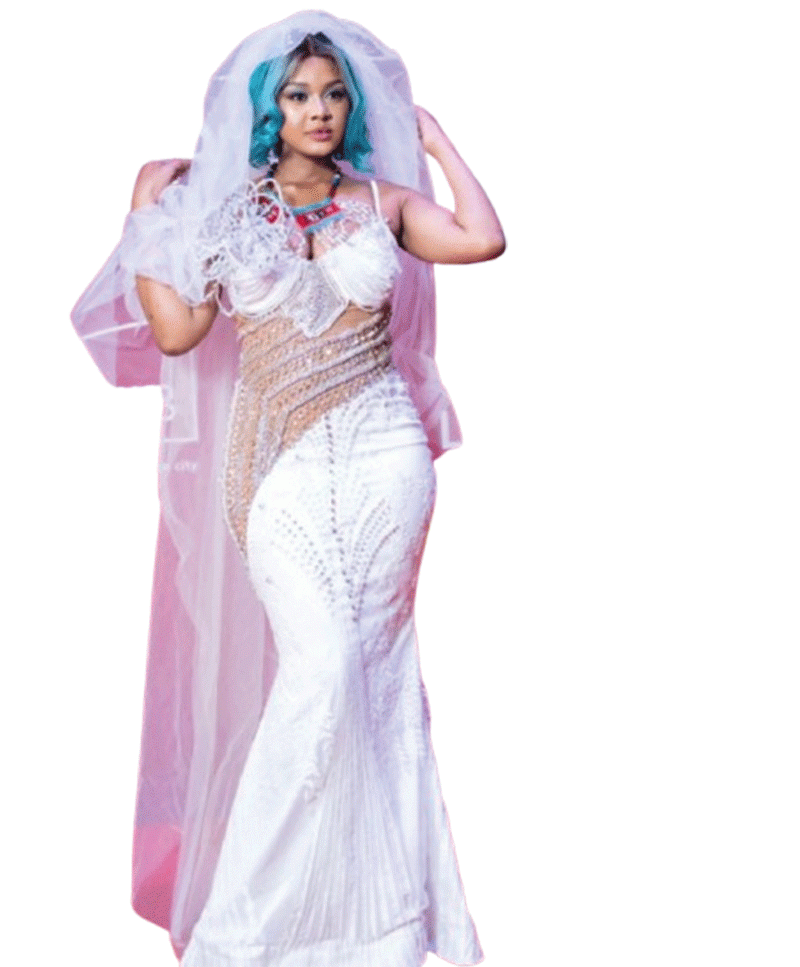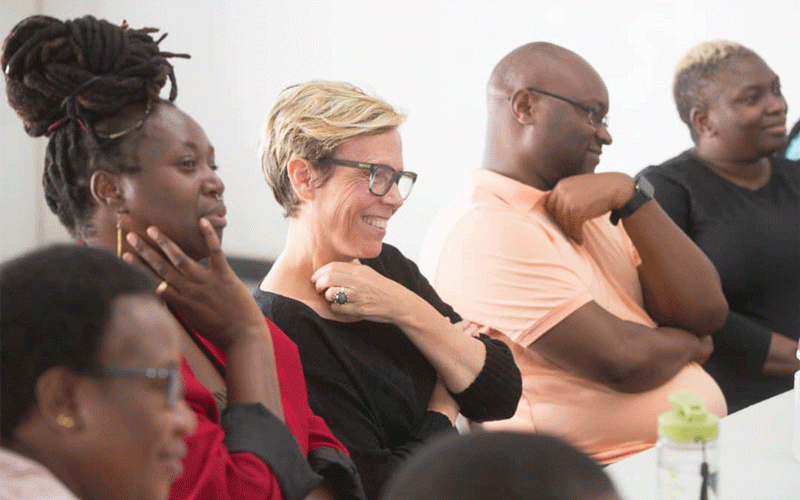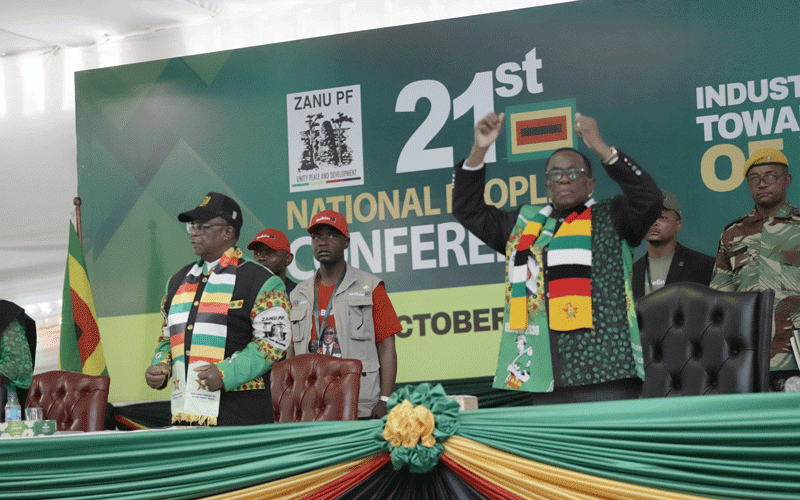
By Grant Moyo
Amanda Marufu, a content creator and feminist reckons that since media in its different forms is an integral part of shifting gender perspectives and changing gender biases, there is need for a wider representation of women both in front of and behind the visual perceptual experience.
Continuing to create content for different mediums that centers on women, Marufu is well versed in problem solving and devolution. She considers feminism not as an identity that has to be performed but a political movement.
This notion is justifiable through her optical, graphic and audio content such as #NoFilter an all female panelist television show, It’s A Feminist Thing an attention-getting podcast, Understanding Online Gender-Based Violence a documentary done in partnership with Hedone, a South Africa-based organisation, as well as her published written material as a contributor, author and blogger.
Marufu, who was born in Kwekwe spent most of her life living in Harare and partly in Gweru and Bulawayo.
She did her primary education at Avonlea Primary School before proceeding to Lomagundi College, Elite College and Speciss College where she completed her Advanced Level.
She holds a Certificate in Gender Representation In Media from the University of Strathclyde, a public research university located in Glasgow, Scotland.
Her work experience varies, besides starting out through volunteer work at Let Them Trust, Marufu has had stints in the media space as a script writer at Dreambox (Animation company), as well as a consultant and photographer at Creative Natives Africa (Advertising agency).
- Chamisa under fire over US$120K donation
- Mavhunga puts DeMbare into Chibuku quarterfinals
- Pension funds bet on Cabora Bassa oilfields
- Councils defy govt fire tender directive
Keep Reading
She has also worked as a digital marketer and content creator for Big Sky (Hardware store), digital marketing assistant at NK Digital (Digital marketing agency), producer at Visual Sensation, and most recently as a digital marketing manager at 3KTV (Broadcasting channel). She has been a part of teams working for brands such as First Mutual, Lit Fest, to mention but a few. Among her notable recognitions include being a global ambassador for The Better Tomorrow Movement (2019) and Africa Innovation Week (2020).
“I had imaginary friends when I was a kid and I found peace and solace within them. I knew about their parents, siblings, dreams, wishes and motivations,” Marufu said.
“As I grew older, I became more and more closely drawn to their fears because most of the time their frights mirrored my own.
“At some point, these imagined friends became stories that I would carry around with me. Written on hardcover pages, I wanted to one day be an author and my friends were my beta-readers.
“Growing to a point of obsession with the art, I began to write homework for my friends, often offering to write their essays for them.
“I would pay attention to how many points I got for each story and how different I could make each story despite the prompt often being the same. I was head-deep stuck in between the pages of a book and when I wanted to speak I would write.”
Marufu added: “It was at the age of 14, when my sister died, that I found all of my old diaries and I realised just how much I relied on these words to showcase my pain.”
“It was the first realisation I had of how depressed I was as a kid. The first time I had to face that, I had created these friends, cultivated these characters, because I couldn’t dare face the reality of my own life.
“At the time, I was volunteering on this account called ‘no_suicide’ created by another teen from the United States.
“I began to grapple not only with my own depression, but the leading lines of abuse and shame that plagued all young people across Zimbabwe, Africa and worldwide.
“I became passionate about spreading awareness and using the media to do it, and this is how ‘The Safe Zone’ was born.”
The Safe Zone, which ran from 2016 to 2017, was an online magazine Marufu started, It had teens from all over the world who came together and not only wrote about issues surrounding abuse, gender and mental health, but donated their time talking to and supporting young teens who needed someone to vent to and wanted to gain some advice.
Before eventually creating her own website, Marufu became an avid contributor on Wattpad, and a blogger on Tumblr.
Burning with the desire to address the plight for women, the feminist launched another blogging platform called It’s A Feminist Thing where she and a number of bloggers tackled topics around feminism, and issues they found did not quite have space in traditional media.
Having also produced and developed content for The Feed and Enthuse Mag, Marufu published her first book titled At What Age Does My Body Belong To Me?, at the height of Covid-19 global crisis. “I wrote this book as yet another attempt at speaking out loud all the pain and shame I had held within me for so long,” Marufu said.
“I was angry because once again I realised that I wasn’t the only one to have been raped or abused.
“I wasn’t the only one to have ever been shamed for my sexuality or locked up and declared unfit to love and care for a body that was my own.
“I wondered for a long time where our stories were. Who was writing them or publishing them? Who was screaming out for us that ‘enough was enough’, because I had grown tired of hearing about the #metoo campaign, but still being expected to be quiet about my pain and act like it was all battle scars that didn’t bite me even now as an adult.”
Since then the content creator and feminist has made it her life’s work to not only write about women and share their stories but to become unapologetic about speaking her truth.
Collaborating on an anthology, In Her Words: African Women’s Perspectives on Gender Equality featuring 15 women from seven different African countries, showed her just how diverse African women are.
It gave her a perspective that across tribes, cities and countries, there is not just one way to be a woman or one unified experience of womanhood.
Women are different and it is within their differences where the beauty lies. Yet this too is not amplified enough in literature and the media.
“Too often, the lived experiences of African women are spoken about authoritatively by people other than them.” Mudzingwa said.
“From the men of today to the ones who wrote down history, and even well meaning non-governmental organisations, African women have often been relegated to the role of spectators in their own life’s stories.
“In the anthology, my essay talks about everyday feminism.
“How it is important to not just wear the feminism label, but to embody feminism principles in all that people do and in the actions they take big and small because often these actions have the most impact.”
Marufu added: “According to the Gender Mapping Project in Zimbabwe only 21%, 12% and 11% female reporters are present in print, radio as well as television respectively, and only 16% of female subjects are reported on across all platforms.”
“Studies like those published by Developmental Science show that kids from as early as three to five years old exhibit both racial and gender biases.”
Marufu’s television talk show #NoFilter fills the void that women everywhere experience when they find themselves in need of advice or a nonjudgmental ear in a ‘no holds bar’ type of way.
A truly synthetic creation of television as a medium that unveils cultural ideas and ideals with hosts becoming surrogates for the masses.
The gender-based violence documentary in partnership with Hedone, an organisation doing work concentrated on sex and pleasure activism, featured different women from across Africa.
The women talked about their online experiences, the gender gap that exist when it comes to opportunities as well as the dangers that exists in regards to online harassment and abuse.
The atrocious consequences lead to physical abuse, death, mental health problems, suicide and the loss of jobs and opportunities.
Regarding the notion that all women want to and should be mothers, Marufu said it is simply not true, yet it is something expected of them.
Even when a woman says she does not want to have children most people will claim that one day she will change her mind as if she does not know herself well enough.
Marufu pointed out that a lot goes into being a mother before people can even talk about finances and security for the child. It can take physical strain, everything from vaginal tearing to the mental toil with loads of mothers getting varying degrees of depression.
The feminist challenges the authorities to educate the society on this issue and also provide women with the choice and knowledge to be able to decide for themselves if motherhood is something they want, respecting their decision regardless of what it is.
Being reputable like American television producer, screenwriter, and author Shonda Rhimes is Marufu’s main ambition.
Having created all forms of content, she strives to continue to grow better and bolder in the gender and media space.
Follow Grant Moyo on Twitter: @TotemGrant










